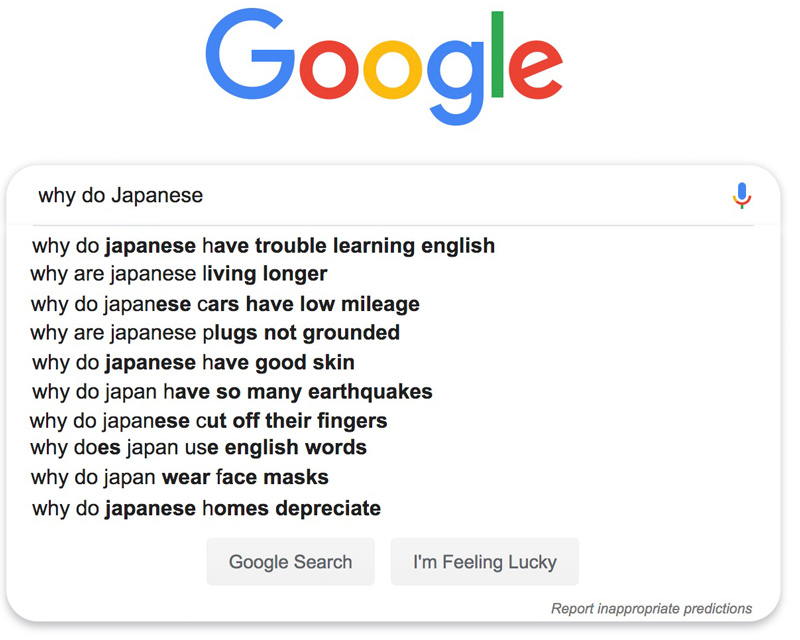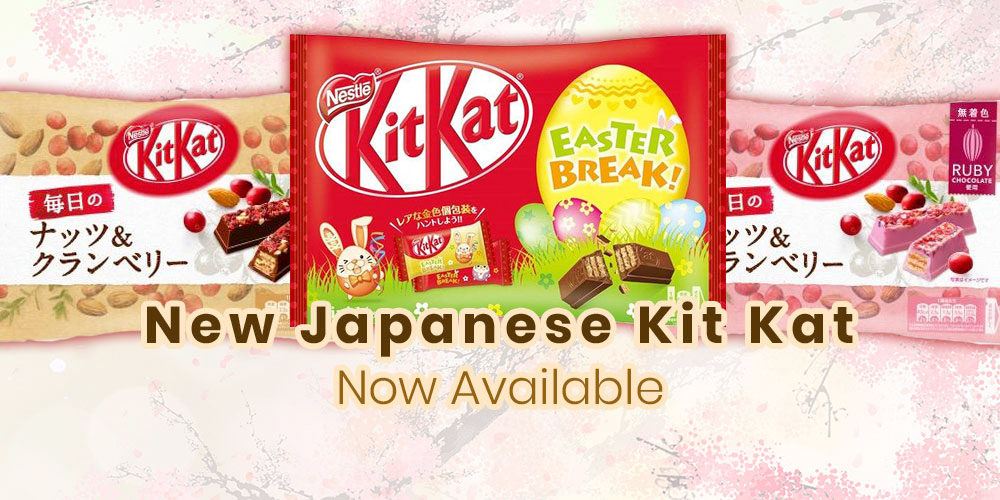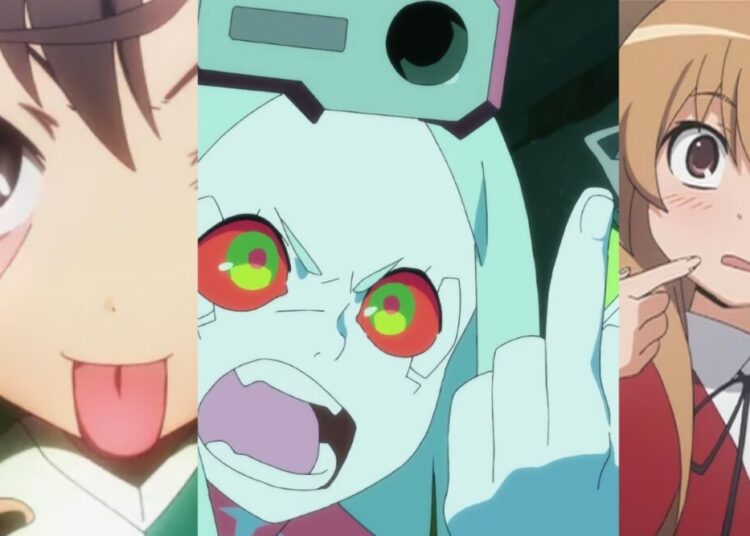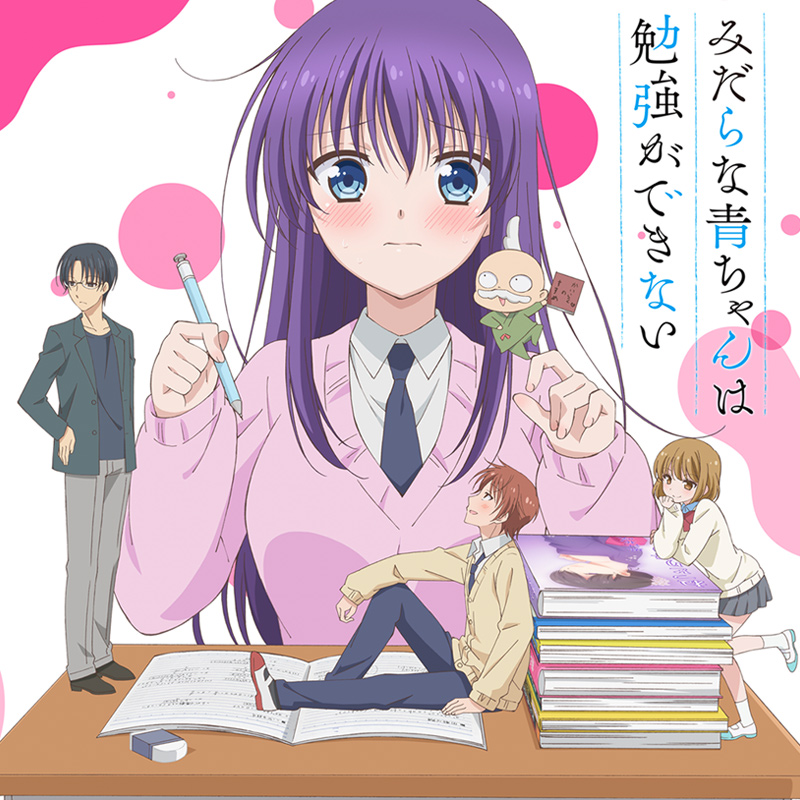Everyone knows you can type a few words into Google and see some search suggestions based on what others have typed in the past. I love seeing what questions people Google about Japan, and have collected some of them here for you today, in case you were curious.
Why is Japan called the land of the rising sun?
When Japan first encountered “China-senpai” in the 1st century A.D., they received the name of 倭 wa, a name thought to have a derogatory meaning. In the 7th century, an envoy from Japan asked that the country’s name be changed to 日本 nihon or nippon, meaning “origin of the sun,” since the sun appears to rise from Japan when viewed from China. China’s name (中国) means “kingdom at the center of the world.”
Why are Japanese traffics lights blue?
For odd linguistic reasons, what you or I would call “green” is often referred to as 青 ao or blue here in Japan. Traffic lights and the word 青年 seinen, a word describing a boy who is still green and unripe, are two examples. I guess the grass is always bluer on the other side.
Why do Japanese have trouble learning English?
It’s an island country where, not counting the recent boom in tourism, few people ever have a chance to use English. English is considered a topic you learn in order to pass your college entrance exams, then forget.
Why is Japanese fruit so expensive?
We’ve all seen stories about Japanese melons that sold for $30,000. This is basically a prize-winning fruit that’s bought by someone at an auction, pretty much as an act of charity to promote a local region of Japan, which is usually a business write-off. Normal fruit is much more reasonably priced.
Why is Japanese rice so sticky?
It’s said that rice should be sticky enough that you can fix a postage stamp to a letter using a grain of cooked rice. Seen from Japan, most Western rice is dry and hard to eat with chopsticks.
Why do Japanese censor cockroaches?
They do? I’ve never encountered this. Now I’m sure I’ll see it everywhere.
Why do Japanese blur out the naughty parts?
Article 175 of the Criminal Code of Japan bans “indecent” materials from being depicted in public. Inside Japan, this has always been interpreted as requiring genitalia to be covered. Back when J-List was getting started, it was illegal to show pubic hair without a silk scarf or something obscuring it, but publishers successfully forced the authorities to allow it and “hair nude” became a thing.
Why do Japanese kneel while eating?
It’s called 正座 seiza, literally “correct sitting.” It’s also done in martial arts.
Why does Japan drive on the left?
In the 19th century, as Japan was modernizing, they took a lot of cues from Great Britain, including importing its locomotive technology. That tradition has continued in the era of the automobile.
Why does Japan call football ‘soccer’?
On the flip side, Japan took most of its cues from the U.S. in the postwar era. And so they imported the American word soccer instead of the British word football.
What does Japan’s flag mean?
The red-and-white flag is called the Hinomaru, or Circle of the Sun. The first reference of the flag dates back to 701. Japanese women draw little Japanese flags in their schedule books to indicate when they’ll get their periods, which I find adorable.
Why is Japan so nationalistic?
While it’s true there are some right-wing folks who drive through city streets in loudspeaker trucks playing old wartime songs or, somewhat more awesomely, the Space Battleship Yamato theme song, these people are only a tiny minority, no more common than KKK members in the U.S. Everyone just ignores them. It’s important to understand how confirmation bias can affect how we perceive a place like Japan and try to fight it by getting information from a lot of varied sources.
Why do the Japanese run with their arms down?
It’s just that Naruto running meme. Nobody actually does that.
Why do the Japanese wear face masks?
They’re worn to protect the wearer from germs and pollen and as a polite way to indicate to others, they should keep away to avoid infection. The practice started during the 1918 Spanish Flu outbreak and never went away.
Why do Japanese people get nosebleeds?
The meme of anime characters getting nosebleeds when sexually excited comes from a 1970 manga called Yasuji’s Life Lessons for Messed Up Kids. No one actually gets nosebleeds when that happens.
Why do Japanese bathe together?
One of the best things about raising kids in Japan is bathing together and interacting while getting clean, which the Japanese call “skinship.” After junior high school starts, kids bathe alone.
Why is Japan’s birth rate low?
All countries experience falling birthrates as they industrialize. In 1900 the fertility rate was 4.5 children per female, and now it’s around 1.4. The challenge to Japan is that its population is actually falling, unlike countries with immigration from other countries, which is why Japan is finally opening its doors to immigration.
Why are Japan’s interest rates so low?
Remember the dot-com bubble and crash? Japan’s huge asset bubble was about 5x as big, and they still haven’t recovered. This caused inflation to fall to nearly zero, and interest rates to follow suit. While it’s nice that J-List can borrow money at 1.1% if we need to build a warehouse or something, the low-interest rates and inflation mean Japan is always stagnating economically. Recently inflation has finally started to become a thing again, which is actually a sign of an improving economy.
Why are Japanese idols not allowed to date?
“Idols” are supposed to maintain a pure image for their fans and never talk about sexy topics.
Why are there Japanese in Peru?
There was a diaspora of impoverished Japanese to Peru, Ecuador, and Brazil in the early 20th century. Many of these Nikkei people come back to Japan to work.
Why do Japanese cars have low mileage?
When I drive somewhere in California, I often end up putting 50-75 miles on my car without thinking about it. Here in Japan, you drive less frequently and don’t go as far. I’ve had my current car for 6+ years but have only managed to put around 12,000 km (7500 miles) on it.
Why do the Japanese live longer?
A safe country with a functioning healthcare system, and good social support networks. Whenever I look at my wife’s mother, who is 83 and regularly interacting with friends she’s known since grade school, I’m envious.
Did you enjoy reading these answers to questions people Google about Japan? Got any questions about Japan you’d like answered? We’re only a Twitter away!
Great news! Although chocolates will be removed from J-List in another couple of weeks, because of the approaching warm weather, we’ve posted some wonderful new limited Japanese Kit Kat flavors to the site, including two versions of Easter Kit Kat, including my personal favorite, banana. So make an order now!

















